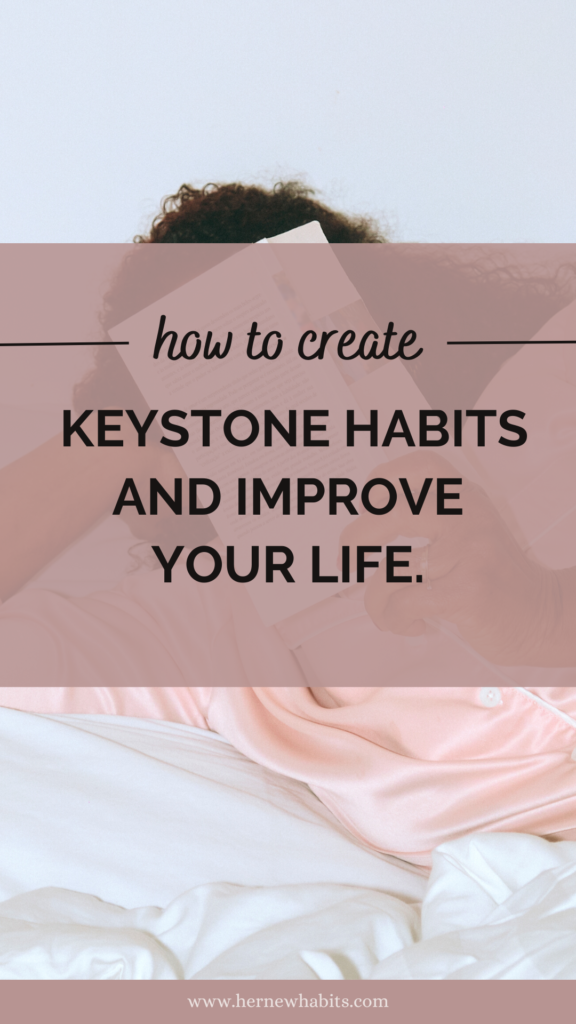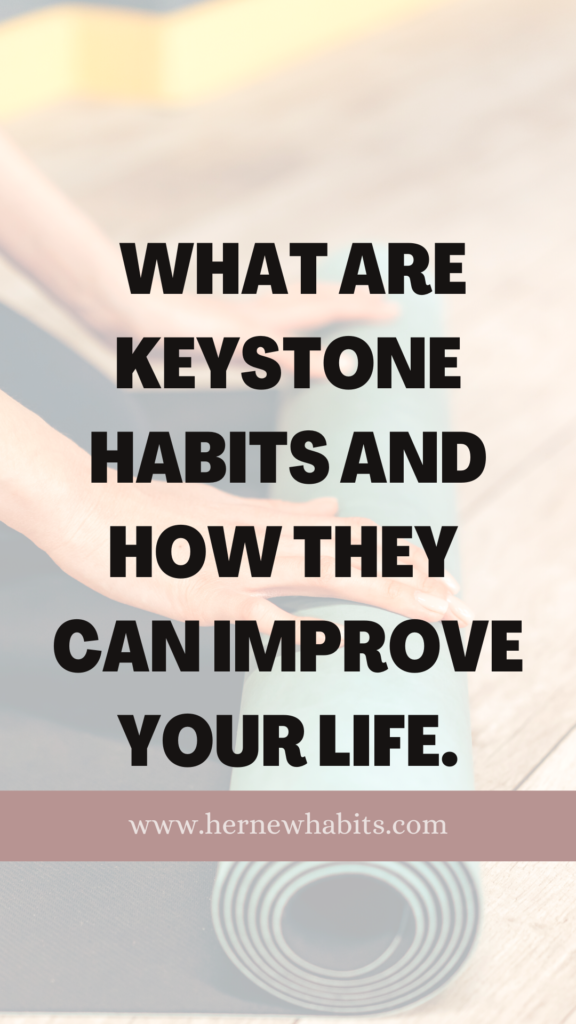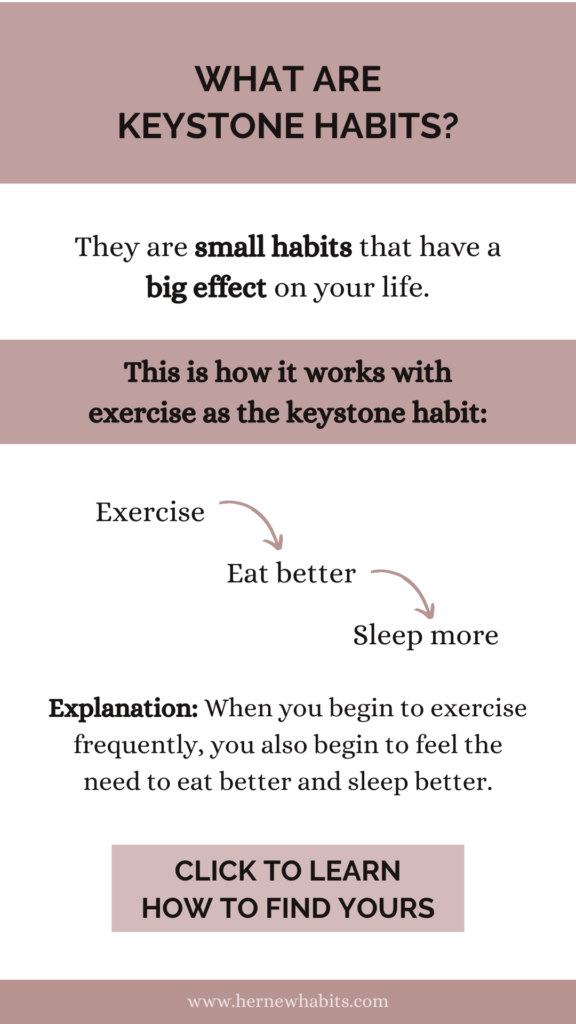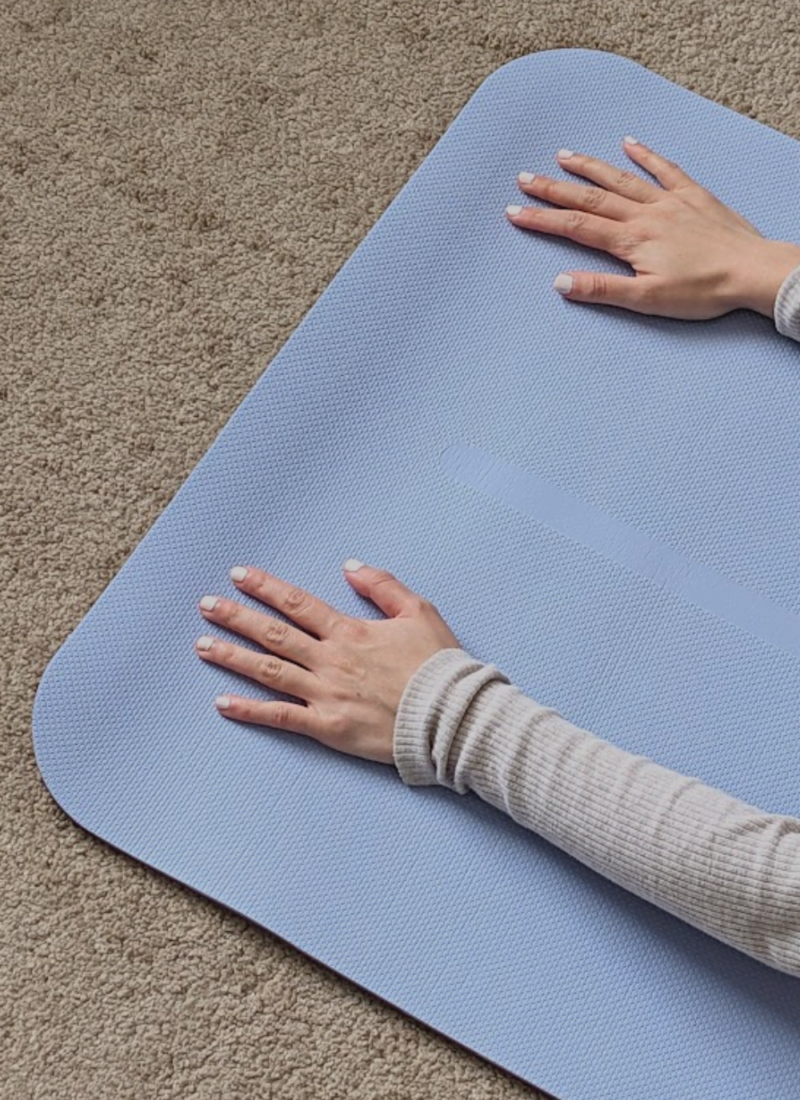Keystone habits are small actions that lead to positive effects in your life. They add up to great results. And they make you happier, healthier, and more productive.
Disclaimer: As an Amazon Associate I earn from qualifying purchases. This means that I get commissions for purchases made through links in this post.

Keystone habits can transform Your Life In 2023
What is considered a keystone habit? It can be anything from exercising to reading more books or meditating. Keystone habits can make a positive impact on your life and make it easier for you to adopt other good habits.
The purpose of this post is to explore the definition of keystone habits, how best to identify them, and how to maintain them.
You’ll also find keystone habits examples that can transform your life for the better
What are Keystone Habits?
There are many different habits that you can adopt to improve your life. Some of these habits are called keystone habits.
The term “keystone habit” was coined by Charles Duhigg in his book The Power of Habit. He defines them as “small changes or habits that people introduce into their routines that unintentionally carry over into other aspects of their lives”.
Keystone habits lay the foundation for other positive changes in a person’s life.
In recent years, I have noticed how keystone habits have changed my life.
For example, when I started exercising I also wanted to eat better. It also made me want to improve my sleep.
Another example is when I go for a walk in the morning, I notice that I can concentrate better, and my mind is much clearer. And I feel more equipped to do the hardest task in the morning after the walk.
What Are Your Keystone Habits?
Keystone habits make it easier for you to create other good habits, which is why you must know what yours are.
Imagine how much easier your life would be if you could accomplish most of your goals by focusing on one thing at a time.
Keystone habits are behaviors that, if you change them, will have a ripple effect on other areas of your life.
The problem is that even though you have these habits, many times you are not aware of them. For this reason, you have not noticed how powerful they can be to change your life.
Now you may be wondering, how do I find my keystone habits?
Well, keep reading.
How Do You Identify Your Keystone Habits?
Know that keystone habits can have a big impact on your work, your health, your relationships, and more.
That is why you must take the time to identify them and change them if necessary.
To do this, you should ask yourself the following questions:
- What do I want in life?
- What things do I do every day that makes me feel better?
- When my life is going great, what behaviors have I had in the last week?
The first question is to understand and establish your life goals.
For example, if you want to be healthy and fit, then one of your keystone habits is exercise. If you want to be financially successful, saving money may be one of your keystone habits.
The last two questions are so you can identify patterns in your behaviors.
Habits are actions that you repeat every day without being aware of them. The same goes for keystone habits, you have them, but you are only sometimes aware of them.
You can make changes to achieve your goals when you consider these three questions.
For example, meditation is a keystone habit to help people clear their minds. It also motivates them to be more present in their daily lives and focus better at work.
5 Keystone Habits Examples:
What are some good keystone habits? I could give you a list with more than 50 keystone habits. Each person has their own keystone habits because they depend on how they react to them.
Is drinking water a keystone habit? Yes.
Is meditating a keystone habit? Yes.
Having a nice dinner with the family every weekend may not make any difference in your life. For other people, it may mean that they have a reason to take better care of themselves or release stress.
What is the best keystone habit? You are the only one who can answer this question. There are also good keystone habits for students or for the workplace. It’s your job to find your own.
Anyone can create habits, but not all habits are for everyone. You want to find and work on the best keystone habits for you.
That’s why in the previous section you learned how to identify your keystone habits.
Here are 5 keystone habits to transform your life for the better.
Keystone habit 1: Follow a morning routine.
A morning routine is a great way to set yourself up for success. It’s a powerful way to start your day and can help you do more in less time by giving you a sense of clarity and focus.
Morning routines are diverse and there is no one way to do it. Each step you include in your routine will depend on your lifestyle and your goals.
A morning routine is a keystone habit that will help you be happier, healthier, and more productive.
One of the best resources I have read on this topic is the book called The Miracle Morning by Hal Elrod.
There, you will find a guide to building a morning routine that helps you stay focused and in a good mood during the day.
Keystone habit 2: Plan the next day.
Planning the next day is a keystone habit because it can have a positive impact on many aspects of your life. It can help with your productivity and creativity, as well as your mood and stress levels.
When you plan your day, you find time for everything. From going to the store to get groceries to spending more time with loved ones.
There are different tools to organize your days, physical or digital. Include everything you want, but make sure you don’t overschedule yourself.
You can do this every day. I prefer to do it the night before, but you can also commit to doing it every Sunday and plan for next week.
You choose when and how to do it. Keystone habits have to fit into your lifestyle and transform your life for the better.

Keystone habit 3: Meditate before bedtime.
Meditation before bed is a keystone habit that will help you sleep better and improve your mental health.
When you meditate your mind enters a different state of consciousness. It activates various parts of your brain and body that are not activated.
Monks, for example, base their lifestyle on meditation. They can spend hours in this state and live a fulfilling life.
There are quite a few things to learn from monks, and one of the best resources I have found is the book Think Like a Monk by Jay Shetty.
If you make meditation your keystone habit, you may be able to focus better, live more in the present, and avoid complaining or criticizing others.
Keystone habit 4: Start your day with gratitude.
Gratitude is the act or feeling of being thankful. It’s showing appreciation for what you have.
It’s a positive attitude that can have a significant impact on your life if you do it often.
A study of people with chronic illnesses found that those who wrote down three things they were grateful for at the end of each day had fewer symptoms and slept better than those who did not.
This keystone habit is an action that, implemented daily, has a positive impact on other habits and behaviors.
The habit of daily gratitude changes the way you live your life, but it can also have a huge impact on the people around you. When you are grateful, you find value in others and are more aware of their presence, which makes the relationship more meaningful.
Keystone habit 5: Make your bed every morning.
Making your bed every morning may seem like a small task, but it’s a powerful habit that can set you up for success.
When you make your bed, you are starting your day with a small victory. You are telling yourself that you are capable of achieving something and that you are willing to put in the effort to do it.
This keystone habit can help you approach the rest of your day with a positive attitude and the belief that you can achieve anything you set your mind to.
Making the bed is also a way to organize the space and start the day from scratch. When your bedroom is clean and tidy, it can help you feel calmer and more focused. And when your mind is free of distractions, you can better focus on your goals and get things done more efficiently.
This is why making the bed every day can be a keystone habit for you, it all depends on your lifestyle and your goals.
How to Make Your Keystone Habits Stick:
Once you identify your keystone habit and commit to working on it, it’s time to add a few steps to stick with it.
There are three parts of Keystone habits: Trigger, routine, and reward. The routine is the habit itself. The other two have to do with what happens before and after the habit.
Keep on reading to understand this better and learn how to stick to your keystone habits.
1. Find the triggers and rewards:
Habits are a powerful force that drives our lives and are present in most of the things we do every day. They are created by your mind and your body when you associate situations, feelings, moments of the day, people, or things with some action.
If you wake up in the morning and feel the urge to drink coffee, you likely do it out of habit. The time of day: the morning is your trigger and having a coffee is the reaction. The delicious taste of coffee or the feeling of uplift after drinking it is the reward you get from this habit.
Rewards are important because they are the reason you stick with your habits. And while they are often thought of as the result, they can also be part of the process. This means that you can also get rewards during the activity.
To better understand this process, take a look at your keystone habits and determine what the trigger and reward are. The following questions will help you with this:
A. Trigger (or CLue): Do you do this activity at the same time or on the same day? Who is around you? Do you notice any particular smell? How do you feel?
B. Reward: What do you get for doing this habit? What is the result of this activity? What makes you want to do this again?
2. Start with the smallest action:
Habits occupy a large part of our day, and if this surprises you it is because some of them are so small that you cannot even notice them.
When you are building or breaking habits, you should know that this process requires a lot of mental energy and for that reason, it is not a surprise that breaking the lip-biting habit is easier than eliminating sugar from your diet.
Every habit takes time and energy, but some need more of that than others. So when you’re building a keystone habit, it’s best to start with something very small and easy to do.
If you want to drink more water throughout the day and have made that your keystone habit, don’t try to drink 64 ounces of water on the first day. Start by drinking a glass more than you usually drink and add a little more each day.
Consistency is better than intensity. This means that doing something every day has better results than doing it all in one day and feeling tired the next day.
Many New Year’s resolutions fail because of this. People try to make big changes to their daily routine in the hope that it will last until December, but it never happens.

3. Plan and study your time:
Keystone habits are the foundation of your daily routine and dictate how you spend your time. Since they can take up most of your time every day, you need to be more aware of them and plan.
When you plan your habits, it will be easier for you to succeed and have a great day. This is because you consciously create space to activate your triggers and enjoy the rewards.
Keystone habits are usually small, but as you practice more, they can build to bigger and bigger ones. Planning will allow you to fit these new habits into your routine.
These habits sometimes also require some additional tools that you must prepare in advance to minimize the time you spend making decisions.
You may think that making your bed in the morning does not require any preparation, but if you think about it a little more you will realize that if you have a busy schedule you have to determine the best time to do it. Would you do it right after waking up or maybe after your first coffee? Or maybe you decide to do it while listening to a podcast.
4. Enjoy the process:
I know this sounds cliché, but I had to say it. If you enjoy what you do, you are more likely to do it again.
If you can’t find anything pleasant in your habit, trick your brain by playing music or singing your favorite song. Using songs with words related to positive feelings will make your brain think you’re having a good time.
Another tip for this is to practice breathing. When your body is faced with a situation that you don’t like, your Nervous System activates and sees it as a danger, so it prepares your body to fly or fight, but breathing will help you control your Nervous System.
The connection between your mind and your body is important in any change you are making in your life. And building and breaking habits are big changes that need your full attention.
To strengthen that mind-body connection, you have to learn to live in the moment. Meditation is great for doing this because it will help you clear your mind of past or future events and will allow you to be more present.
Final Thoughts
Keystone habits are small changes you make to your routine that have a big effect on your life.
When you start with these keystone habits, you will have the ability to develop other good habits, as they simply create a ripple effect.
The keystone habit is one that, when practiced, can influence other habits and even other people’s lives.
Like any habit, it’s important to find ways to implement them into your daily routine, but habits that work for others may not work for you.
You have to pay more attention to the things you do every day and how they make you feel. If you do something that makes you feel great and also helps you adopt other good habits, then it’s probably a Keystone habit.
Disclaimer: As an Amazon Associate I earn from qualifying purchases. This means that I get commissions for purchases made through links in this post.




Leave a Reply